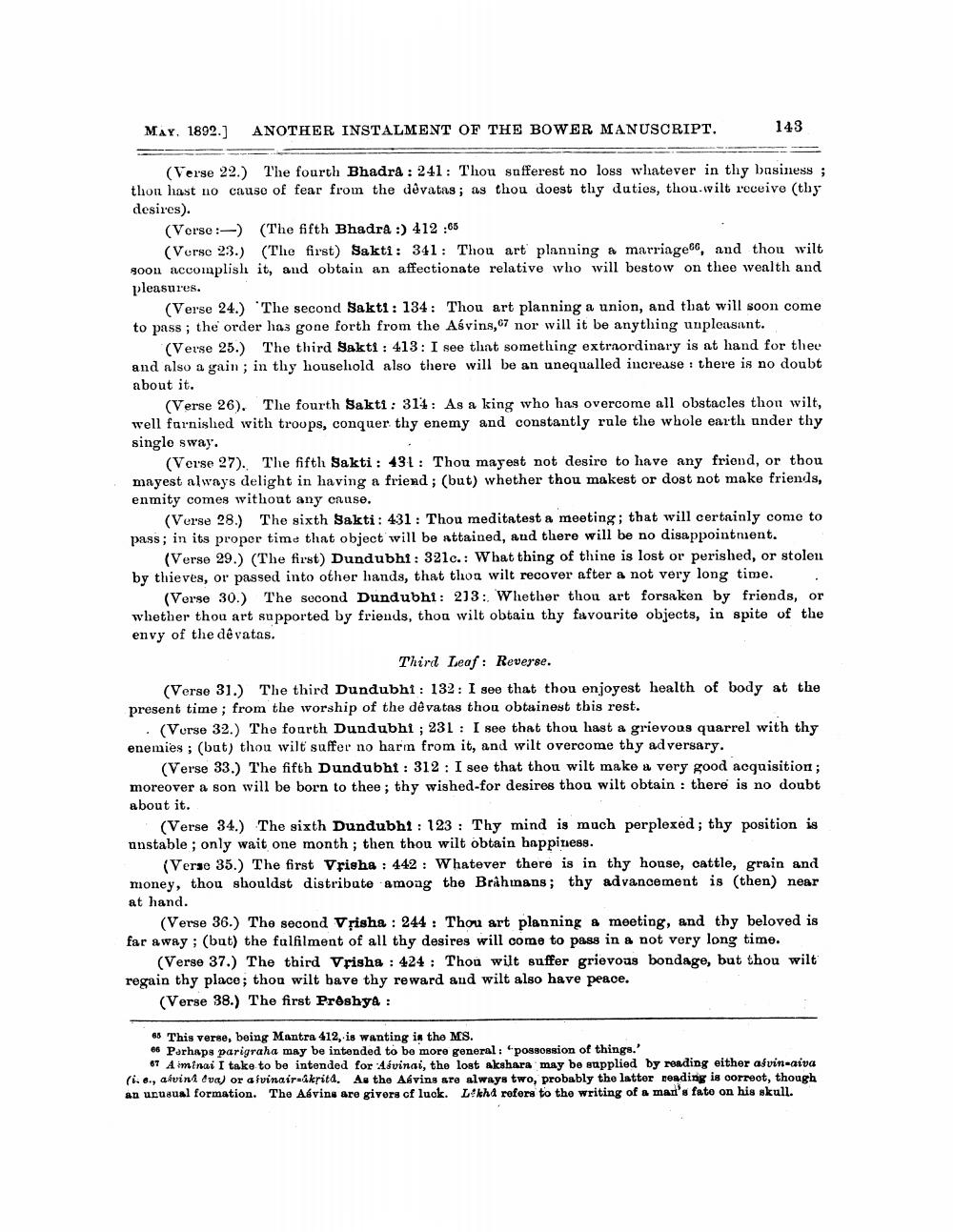________________
Mar. 1892.] ANOTHER INSTALMENT OF THE BOWER MANUSCRIPT.
143
(Verse 22.) The fourth Bhadra : 241: Thou sufferest no loss whatever in thy business ; thou hast no cause of fear from the devatas; as thou doest thay duties, thou wilt receive (thy desires).
(Verse :-) (The fifth Bhadra :) 412.65
(Verse 23.) (The first) Sakti: 341: Thou art planning a marriage, and thou wilt soon accomplish it, and obtain an affectionate relative who will bestow on thee wealth and pleasures.
(Verse 24.) 'The second Baktı : 134: Thou art planning a union, and that will soon come to pass; the order has gone forth from the Asvins,67 nor will it be anything unpleasant.
(Verse 25.) The third Sakti : 413: I see that something extraordinary is at hand for thee and also a gain; in thy household also there will be an unequalled increase : there is no doubt about it.
(Verse 26). The fourth Sakti: 314: As a king who has overcome all obstacles thon wilt, well farnished with troups, conquer thy enemy and constantly rule the whole earth under thy single sway.
(Verse 27). The fifth Sakti: 431: Thou mayest not desire to have any friend, or thou mayest always delight in having a friend ; (but) whether thou makest or dost not make friends, enmity comes without any cause.
(Verse 28.) The sixth Sakti: 431 : Thou meditatest a meeting; that will certainly come to pass; in its proper time that object will be attained, and there will be no disappointment.
(Verse 29.) (The first) Dundubhi: 321c.: What thing of thine is lost or perished, or stolen by thieves, or passed into other hands, that thou wilt recover after a not very long time. .
(Verse 30.) The second Dundubhi: 213: Whether thou art forsaken by friends, or whether thou art supported by friends, thou wilt obtain thy favourite objects, in spite of the envy of the devatas.
Third Leaf : Reverse. (Verse 31.) The third Dundubhi: 132: I see that thou enjoyest health of body at the present time; from the worship of the dêvatas thou obtainest this rest.
. (Vurse 32.) The fourth Dundubhi ; 231 : I see that thou last a grievous quarrel with thy enemies; (but) thou wilt suffer no harm from it, and wilt overcome thy adversary.
(Verse 33.) The fifth Dundubhi : 312 : I see that thou wilt make a very good acquisition; moreover a son will be born to thee; thy wished for desires thou wilt obtain : there is no doubt about it.
(Verse 34.) The sixth Dundubht: 123: Thy mind is much perplexed; thy position is unstable ; only wait one month; then thou wilt obtain happiness.
(Verse 35.) The first Vrisha : 442 : Whatever there is in thy house, cattle, grain and money, thou shouldst distribute amoag the Brahmans; thy advancement is (then) near at hand.
(Verse 36.) The second Vrisha : 244 : Thou art planning & meeting, and thy beloved is far away ; (but) the fulfilment of all thy desires will come to pass in a not very long time.
(Verse 37.) The third Vrisha : 424 : Thou wilt suffer grievous bondage, but thou wilt regain thy place; thou wilt bave thy reward and wilt also have peace.
(Verse 38.) The first Presbya :
This verse, being Mantra 412, is wanting in the MS. 66 Parhaps parigraha may be intended to be more general: "possossion of things.'
67 Aiminai I take to be intended for 4śvinai, the lost akshara may be supplied by reading either afvin-aiva (i.6., avini dua or a fvinair-akrita. As the Asvins are always two, probably the latter reading is oorreot, though an unusual formation. The Abving are givors of luck. L'kh refers to the writing of a man's fato on his skull.




